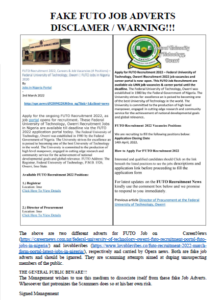To be admitted into the 5 –year B. Agric. Tech degree with a specialization in Agricultural Economics, the candidate must possess either of the following:
i. University Tertiary Matriculation Examination (UTME) Entry Requirements
In addition to an acceptable pass in UTME, candidates must have Senior Secondary School Certificate with credit passes in 5 subjects, which must include English Language, Chemistry, Biology or Agric. Science., Mathematics, and at least a pass in Physics at not more than two sittings. The UTME subjects shall comprise of English language, Chemistry, and any two subjects from Physics, Biology/Agricultural Science and Mathematics.
ii. Direct Entry Requirements
- HSC/GCE A’ level passes in Biology/ Agric. Science and another science subject, in addition to processing the O’level requirements.
- Holders of OND/ND Certificates with a minimum of upper credit pass are eligible for admission into Year II while holders of HND certificate with a minimum of upper credit passes are eligible for admission into Year III. In addition, the holders of OND/ ND or HND must satisfy the O’level requirements.
- Holders of FUTO JUPEB (Joint Universities Preliminary Examination Board), Basic Studies Programme Certificate are eligible, provided they possess five O’level credit passes at not more than two sittings in English Language, Mathematics, Chemistry, Physics Biology/ Agricultural Science.


